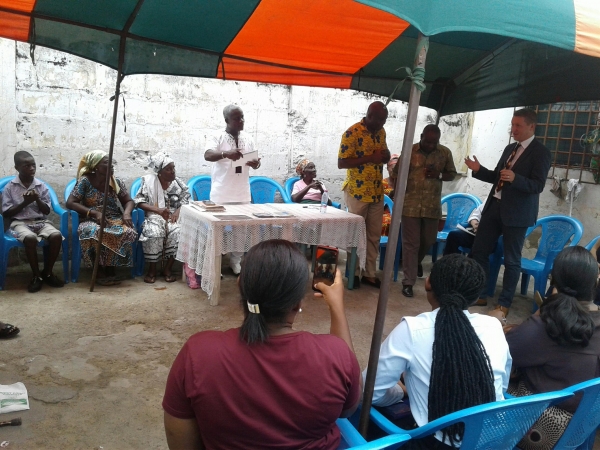The visit was facilitated by BasicNeeds-Ghana and the Mental Health Authority. BasicNeeds-Ghana received funding from UK aid to undertake a five-year project titled “Supporting Government of Ghana to Build a Community Mental Health System” which came to an end in 2019, after it was extended for a year. Through this project, 44,091 people were supported to access mental health services and linked to 569 self-help groups, also formed under the project.

Among those who took part in the visit were the British High Commissioner to Ghana – His Excellency Iain Walker, and his Deputy; the Spanish Ambassador to Ghana – Her Excellency Alicia Rico Pérez; DFID Country Director – Philip Smith; DFID Ghana Health Advisor – Luisa Hanna; DFID Ghana Social Development Advisor – Susan Adwoa Mensah; WHO Country Representative – Dr. Owen Kalua; Disease Prevention and Control Officer at WHO office in Ghana – Dr. Sally Ohene; and UNICEF Ghana’s Health Specialist – Dr Peter Baffoe, among others.
The visiting group was welcomed to the Accra Psychiatric Hospital by Dr Akwesi Osei, CEO of the Mental Health Authority. He gave a brief history of the hospital and acknowledged DFID’s support to the facility that has enabled it to keep its doors open to clients. He led the visitors on an inspection tour to the rehabilitation centre, the forensic unit and the children’s unit of the hospital. They also visited the Jamestown and Ussher Fort Polyclinics to assess the state of mental health services at these facilities.
The group took time to also visit and interact with the Pillar II peer support group of people with mental illness and their caregivers at the Ussher Fort Polyclinic. During the interaction, members of the self-help group described their experiences with mental illness. They acknowledged DFID’s support in helping them to overcome some of their challenges. Members of the group who spoke expressed their appreciation to DFID through whose sponsorship BasicNeeds-Ghana has supported them to access treatment services and engage in income generating activities by giving them cash grants, tools and equipment. Abdul Razak Tetteh, a member of the group, said “My carer was first given a dressmaking machine to set her up as a seamstress. She used the proceeds from her dress-making business to take care of me. After undergoing treatment for some time, my health improved, and I approached BasicNeeds-Ghana again for support. This time, they gave me a cart which I now use to make money to support my family and myself.” Sarah Sackey, secretary of group, said “ I received a cash grant from BasicNeeds-Ghana which I used to augment my business capital. This enabled me to expand my cosmetic business and so make more profit which I use to buy my medications and support my family needs. I’m so grateful to BasicNeeds-Ghana for their support.”
At the end of the visit, the British High Commissioner, H.E. Iain Walker, remarked that he is impressed with the efforts of BasicNeeds-Ghana to help persons with mental health care needs to benefit from treatment and to work together through the SHGs. He added that mental health issues are the same everywhere and stigma is a factor that is affecting the much needed and deserved support mental health should get. He added that It was for this reason that DFID/UK aid is supporting Ghana to work to improve mental health care services and challenge social stigma against mental health issues.The Country Director of DFID, Philip Smith, said that the British Government had invested ten million Pounds (GBP£10 million) to support the development of mental health care and rehabilitation of persons with mental illness in Ghana and he was delighted to see that the investment had borne such results which they were seeing in the lives of people with lived experience of mental health.
Executive Director of BasicNeeds-Ghana, Peter Badimak Yaro, said the visit of such a high powered team of officials is significant and an endorsement of the growing attention to mental health. He further said the acknowledgement of BasicNeeds-Ghana’s community approach to mental health care and socio-economic rehabilitation is satisfying. He said that he and the BasicNeeds-Ghana team were encouraged and would continue to deliver on the organisation’s vision and mission, working closely with government and donors.


